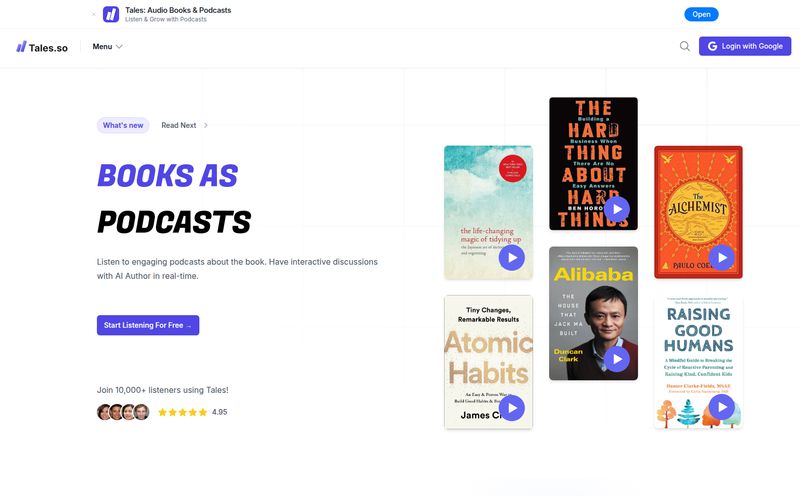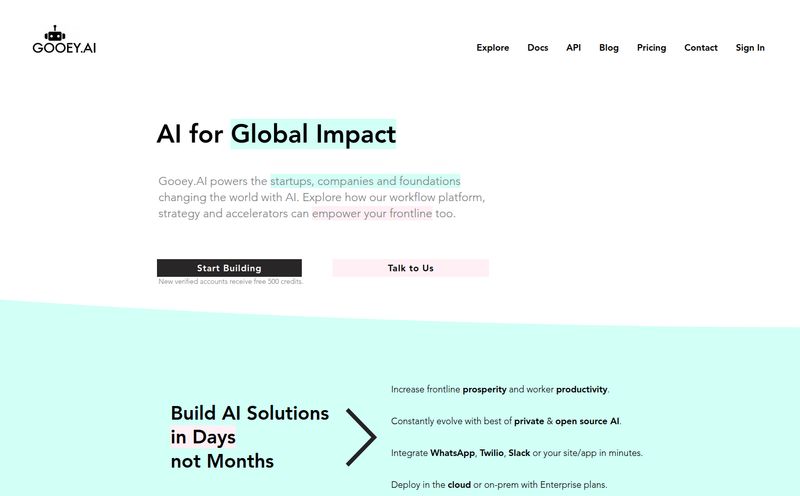The last few years have been... a lot. We're all carrying a bit more weight on our shoulders. And if you’ve ever thought about talking to a professional, you've probably hit the same two walls I have: the sky-high cost and the six-month waiting list. It can feel like you need to be in a full-blown crisis just to get on the schedule. So, when I first heard about AI therapists, my tech-loving SEO brain lit up, but my human side was, let's say, skeptical.
An AI psychologist? A robot shrink? It sounds like something straight out of a Philip K. Dick novel. But the more I looked into it, the more I saw platforms like PsyScribe popping up. They promise personalized mental health support, anytime, anywhere, without the judgment or the price tag. But does the reality match the hype? I had to find out. This isn't just another tech review; it's a look at whether a piece of code can genuinely help us untangle the messy, wonderful chaos of being human.
What Exactly is PsyScribe? (Beyond the Marketing Spiel)
So, what’s under the hood here? PsyScribe pitches itself as an AI therapist designed to be your personal mental health ally. You can chat with it whenever you want, day or night, in what they claim is a totally secure and anonymous space. The core idea is that you can just... talk. You share your thoughts, your frustrations, the weird dream you had last night, and in return, you get personalized advice, exercises, or just a compassionate, listening ear.
Think of it less like a C-3PO of therapy and more like an interactive journal that talks back. It’s built to learn from you, adapting to your needs. Some days you might need a guided breathing exercise. Other days, you might need help reframing a negative thought. The platform aims to provide that, acting as a sort of mental health first-aid kit in your pocket. It's an intriguing concept, for sure.

Visit PsyScribe
The Big Draw: Why People Are Turning to AI for Mental Health
It's not just about the novelty. There are some very real, very human reasons why a tool like PsyScribe is getting attention. And frankly, they tap directly into the biggest failings of our current mental healthcare systems.
The 3 AM Lifeline
You know that feeling. It’s 3 AM, the house is quiet, and your brain decides it’s the perfect time to replay every awkward thing you’ve ever said. Your therapist, quite reasonably, is asleep. Your friends are too. But an AI? It’s always on. This 24/7 availability is probably the single biggest advantage. It means you can get immediate support the moment you're spiraling, rather than having to bottle it up until your appointment next Tuesday.
Anonymity and The Judgment-Free Zone
There's still a massive stigma around mental health. Admitting you need help is hard. Admitting it to a person, a stranger, can feel impossible. The fear of being judged is real. With an AI, that fear kind of evaporates. It’s hard to feel self-conscious when you’re talking to a series of algorithms. This anonymity can be incredibly freeing, allowing people to be more honest than they might be with a human, at least at first.
Let's Talk About the Cost
This is the elephant in the room. In the U.S., a single therapy session can easily cost upwards of $200. That is, simply put, out of reach for millions of people. PsyScribe is marketed as a “cost-effective” solution. Now, digging around, I couldn't find a clear pricing page, which is a bit of a pet peeve of mine. This suggests it might be in beta, or perhaps operates on a freemium model. Either way, it’s positioned to be a fraction of the cost of traditional therapy, which lowers the barrier to entry significantly.
The Personalization Promise: Is It Really My Therapist?
This is where my inner skeptic really kicks in. PsyScribe’s big claim is that its AI is “fully personalizable.” That’s a bold statement. In the world of AI, personalization can mean a lot of things. At its most basic, it could just mean it remembers your name. At its most advanced, it could mean the AI learns your unique communication patterns, understands your core anxieties, and tailors its responses based on months of conversation history.
Does it notice that you get anxious about work every Sunday evening? Does it learn that you respond better to direct advice than open-ended questions? That's the real test. Without that deep learning, it’s just a glorified chatbot with a library of self-help quotes. If it can truly adapt and grow with you, then it becomes something much more powerful. I have to say, the potential is exciting, even if I'm reserving my final judgment.
Okay, But Let's Be Real: The Limitations of an AI Shrink
For all its promise, we have to be grounded. An AI therapist is a tool, not a panacea. And its limitations are just as important to understand as its benefits.
This Isn't a Crisis Line
This is the most important point, and I'll put it in bold: PsyScribe is not for severe mental health conditions or crises. If you are in serious distress or considering self-harm, you need to talk to a human immediately. An AI is not equipped to handle that. It can’t make a real-world intervention. It’s designed for sub-clinical support—managing stress, anxiety, and everyday wellness. It's a support tool, not an emergency service.
| Good For 👍 | Not For 👎 |
|---|---|
| Managing daily stress & anxiety | Severe depression or anxiety disorders |
| Journaling & self-reflection | Suicidal thoughts or crisis situations |
| Practicing mindfulness exercises | Diagnosing mental health conditions |
| A first step into mental wellness | Replacing a human therapist |
The Missing Human Element
There's a certain magic to human connection that an AI, no matter how sophisticated, just can't replicate. True empathy. The shared understanding in a therapist's eyes. The ability to read between the lines of what you’re saying. For many, this is the entire point of therapy. An AI can simulate empathy, but it can’t feel it. Some poeple will always find that a dealbreaker, and that's perfectly okay. This is a supplement, not a replacement.
So, Who is PsyScribe Actually For?
After weighing it all, a clear picture of the ideal PsyScribe user starts to emerge. It’s not for everyone, but for a specific group of people, it could be a game-changer.
I see it being perfect for someone who's “therapy-curious” but not ready to make the leap to a human therapist. It’s a fantastic, low-stakes way to get your feet wet. It’s also a great tool for people who are already in therapy and want a sounding board between sessions. Or for the busy professional who needs to decompress after a stressful meeting but only has ten minutes. It’s for the night owl wrestling with anxiety, or the student overwhelmed by exams. It’s a stepping stone, a maintenance tool, a mental wellness multitool for the modern age.
How PsyScribe Stacks Up in a Growing Field
PsyScribe isn't alone in this space. Veterans like Woebot and Wysa have been using CBT-based chat interfaces for years, and they've shown real promise in peer-reviewed studies. Where PsyScribe seems to be trying to differentiate itself is with that deep emphasis on being “fully personalizable.” While others follow a more structured, almost curriculum-like path, PsyScribe appears to be aiming for a more free-flowing, conversational relationship that learns and adapts over time. It's a subtle but important distinction in a field that's getting more crowded by the day.
Frequently Asked Questions
- Is PsyScribe free to use?
- The platform is described as "cost-effective," but specific pricing information isn't readily available on their site. This could mean they have a free trial, a freemium tier, or are still finalizing their pricing model. It's likely much cheaper than traditional therapy.
- Is talking to an AI therapist safe and private?
- PsyScribe emphasizes that its environment is secure and anonymous. This is a cornerstone of its design. As with any app that handles personal data, it’s always a good idea to read the privacy policy, but the appeal is rooted in this promise of confidentiality.
- Can PsyScribe replace my human therapist?
- In a word, no. It's best viewed as a supplemental tool for support, not a replacement for professional human care. For complex issues, trauma, or severe conditions, a qualified human therapist is irreplaceable.
- What kind of problems can PsyScribe help with?
- It seems best suited for managing day-to-day stress, mild to moderate anxiety, working through negative thought patterns, and building self-awareness. Think of it as a coach for your mental fitness.
- How do I start using PsyScribe?
- You can typically start by visiting their official website and signing up. The process is usually straightforward, allowing you to begin chatting with your personal AI therapist almost immediately.
Final Thoughts: A New Tool in the Mental Wellness Box
So, where do I land on PsyScribe and the idea of an AI therapist? I’m still a skeptic, but I’m an optimistic one. No, this will never replace the profound connection of human-to-human therapy. It's not supposed to. But that’s like saying a bicycle is useless because it’s not a car.
PsyScribe represents a different kind of tool for a different kind of need. It’s accessible, its anonymous, and it’s always there. For millions of people who currently have zero support, that is a massive step forward. The future of mental wellness isn't a single solution; it’s about having a whole toolbox. And PsyScribe is a fascinating, powerful, and imperfectly brilliant new tool to add to the collection. And in a world that keeps getting crazier, I'll take all the tools I can get.
Reference and Sources
- For immediate help, contact the 988 Suicide & Crisis Lifeline by calling or texting 988 in the US and Canada.
- To learn more about the platform discussed: PsyScribe (official website link would go here).
- Gavin, J., et al. (2020). "The Efficacy of a Digital Mental Health Intervention (Wysa) for Chronic Pain: A Randomized Controlled Trial." Published in the Journal of Medical Internet Research. (Illustrates the research being done on similar platforms).



